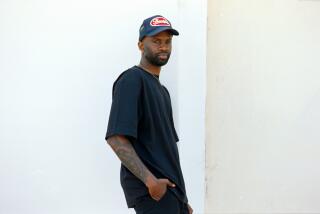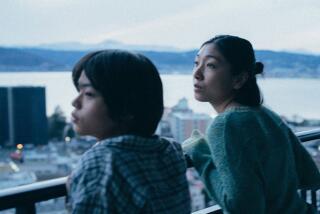Review: Hearts hang in the balance of ‘Like Father, Like Son’
“Like Father, Like Son” is a deceptively simple title for a film of considerable emotional complexity. Its children-switched-at-birth story sounds schematic, but what we see on screen is both meaningful and deeply moving.
If you are familiar with the work of writer-director Hirokazu Kore-eda, none of this will come as a surprise. As one of Japan’s most respected filmmakers (his earlier films include “After Life,” “Nobody Knows” and “Still Walking”), there is a gentleness and delicacy of touch about his work that almost defies belief. Stories like this one, which would run the risk of being overdone in other hands, become quite the opposite in his.
FOR THE RECORD:
“Like Father, Like Son”: In a review of the film “Like Father, Like Son” in the Jan. 24 Calendar section, Masaharu Fukuyama was identified in the review and photo caption as Fukuyama Masaharu. The review also identified Machiko Ono as Ono Machiko.
A film that quietly but deftly examines what defines a family, “Like Father, Like Son” began with Kore-eda’s own thoughts (“all of my quandaries and questions and, indeed, regrets,” he says in a director’s statement) on becoming a father himself.
BEST MOVIES OF 2013: Turan | Sharkey | Olsen
Kore-eda is especially suited to this film because, as his earlier films have demonstrated, he has an exceptional gift for working with child actors, a connection that invariably allows them to come off as real and unaffected on screen.
Taking place over the course of a year, “Like Father, Like Son” begins with a big day in the life of 6-year-old Keita (Keita Ninomiya): It’s his formal interview with a posh private school. Serious but with a playful side, Keita is the only child of impeccably tailored, upwardly mobile parents Ryota (top Japanese singer Fukuyama Masaharu) and Midori (Ono Machiko).
A workaholic architect, Ryota is also a bear for discipline who can’t stand “quitters.” He admires his wife Midori’s kindness but worries that too much of it can be a fault in a parent. Everything changes when they get a call from the hospital where Keita was born. “I hope it’s nothing messy,” says Ryota, but he is fated to hope in vain.
What they are told at the hospital is a terrible shock: Keita, the boy they have been raising, is not their biological son. A disgruntled hospital employee, for reasons of her own, did a baby switch, and they have been bringing up someone else’s child.
PHOTOS: Behind the scenes of movies and TV
The hospital arranges a meeting with the other family involved and tells both sets of parents that in previous cases all parents eventually make the exchange. How that dynamic will play out in this case is something neither set of parents want to rush.
The mother and father who have been raising Ryota and Midori’s biological child couldn’t be more different, especially where father Yudai (Lily Franky) is concerned. Shambling, disorganized, unkempt, Yudai comes off as a stoner personality (absent the drugs) who even drives a camper bus. An electrician who owns a run-down local store, Yudai is kind of a big kid himself, someone whose motto is “put off to tomorrow whatever you can.”
The sets of parents decide that what is best for the children would be to switch their sons for weekends, so both families could get used to each other before the serious final decision has to be made. This, not surprisingly, leads to complications. Keita enjoys life with his new family and an easygoing dad who is great at fixing toys and believes that “being a father is the most important job in the world.”
“Like Father, Like Son,” however, is careful not to paint Yudai as an ideal. Always thinking about money, he is forever looking for ways to syphon as much cash out of the apologetic hospital as possible. He may be a swell father, but he is not without his flaws.
The switch of sons is most disconcerting for Ryota, who finds his former unshakable assurance threatened on any number of fronts, not the least of which is the unexpected stubbornness he comes across in the biological son who is more like him than he perhaps would like.
RELATED: More movie reviews by The Times
Ryota, as it turns out, has long had a problematic relationship with both his stepmother and his autocratic father who believes that with children, as with racehorses, “it’s all about bloodlines.”
For Ryota, it turns out to be not quite so simple. This discovery of who is and who isn’t his biological son shakes up his life in ways he didn’t anticipate, revealing emotions he didn’t know he had and changing his notions both of what it means to be a father and what it meant to be a son.
Powered by Kore-eda’s innate restraint and natural empathy, “Like Father, Like Son” takes these characters to places they never expected to be. It’s unnerving for them, of course, but watching so many hearts hanging in the balance is a rare privilege for us.
------------------------------
‘Like Father, Like Son’
No MPAA rating
Running time: 2 hours
Playing: Laemmle Royal Theatre in West Los Angeles and the Laemmle Playhouse in Pasadena.
More to Read
Only good movies
Get the Indie Focus newsletter, Mark Olsen's weekly guide to the world of cinema.
You may occasionally receive promotional content from the Los Angeles Times.











